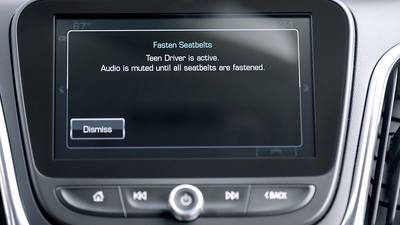Teen Driving Help For Parents - IIHS
Many vehicles today have features that give parents extra control over their teen’s driving, but salespeople often require prompting before they mention them to prospective buyers, researchers from the Insurance Institute for Highway Safety have found. Information about the features can be difficult to find online too.
Parents may appreciate being able to limit the speed of their child’s vehicle, keep track of its whereabouts or prevent it from being put in gear if the driver hasn’t buckled up. However, they need to know about these features in order to take advantage of them.
In an earlier survey of Ford owners who were also parents of driving-age teenagers, more than a third were unaware that their vehicle came equipped with the MyKey system (see “Parents use Ford system to place limits on teen drivers,” Sept. 13, 2018).
Dealers can play an important role in filling this information gap, but the new study found that many salespeople don’t mention such features to parents shopping for their teen driver unless specifically asked.
“Vehicle monitoring systems can improve the behavior of teen drivers and reassure their parents,” says IIHS Research Scientist Rebecca Weast, the study’s lead author. “Dealers could make this a bigger selling point with parents shopping for their new drivers.”
Manufacturer websites could also do more to promote the feature. In a separate analysis, IIHS researchers found that, for three of the four brands studied, consumers would need to spend a significant amount of time sifting through information before finding teen safety features. The ability to learn about vehicles online has become more important as the coronavirus has limited dealer operations.
Out of the dozen brands that offer some type of teen safety system, the researchers focused on Chevrolet, Ford, Hyundai and Kia.
For the study of salesperson knowledge, two researchers visited dealerships, posing as parents looking for a vehicle for their new teen drivers. Interviews with a total of 40 salespeople — 10 from each of the four brands — were included in the analysis.
The researchers went through a series of stages in their interactions with the salespeople. In the first stage, they introduced themselves and said they were shopping for their teenage son’s first vehicle. They then mentioned their concern about safety. In the third stage, they mentioned seeing an ad about safety features geared toward teens. In the final stage, they mentioned the brand’s teen safety package by name.
Twenty-six of the 40 salespeople brought up the safety package by name before the final stage, but most of these mentions came in Stage 3, after the researchers talked about seeing the ad. Only three salespeople brought up their brand’s teen safety system in the first stage.
Most of the salespeople were able to talk at least in general terms about the teen features, though in many cases their knowledge about how they work was quite limited.
Of the four brands, only Chevrolet makes it easy to find teen safety information on its website. A link labeled “Teen Driver” can be found at the bottom of the homepage and many other pages. Two of the popular vehicles that are equipped with the technology, the Malibu and the Equinox, have it prominently featured on their pages as well.
Teen safety features are hardest to find on Ford’s website. Its MyKey system has been around the longest and is no longer emphasized. The researchers found that locating the information required knowing the name of the system; searching for “teen safety” on the Ford website didn’t bring it up.
Hyundai and Kia each required two clicks from the homepage to get to the systems that allow parents to set limits for teen drivers. Kia, however, doesn’t mention teenagers in its description of its UVO system, which has other uses such as remote climate control and remote door locking.
Salesperson knowledge of teen-specific vehicle safety features
Objective: Teen drivers experience elevated crash risk compared with experienced adult drivers. Active parental oversight can improve teen driving safety, and several manufacturers have released teen-focused safety features over the past decade. Still, parents don’t always use these systems and often don’t even know their vehicle is equipped. A recent survey found that parents who do know about such systems on their vehicle first learned of them from a salesperson at a dealership. The current study examined how salespeople discuss and sell teen-specific safety systems on vehicles to parents shopping for a new teen driver. Methods: The study focused on four vehicle brands. Two researchers posed as the parents of a new teen driver who were shopping for a vehicle for their teen. They entered dealerships and conducted semistructured interviews with the salesperson that approached them, using prompts of increasing specificity about their teen driver and their interest in safety, and tracking at what point each salesperson mentioned their brand’s teen-specific systems, what features they mentioned, and how accurate those mentions were. Results: Thirty of the 40 participating salespeople were able to mention their brand’s teen-specific system at some point during the procedure. Hyundai salespeople most consistently brought up their brand’s teen features, and Chevy salespeople mentioned the most features while Ford salespeople mentioned the fewest. Salespeople often mentioned speed-related features, although the most commonly mentioned features varied by brand. No participating salespeople reported receiving training specifically about their brand’s teen features. Conclusions: Most salespeople approached did mention their brand’s teen-focused safety systems, but did not usually do so until they had received more targeted prompts. Information these salespeople did share was often vague and general. Salespeople are a key source of information about a vehicle’s specific and relevant safety features, and parents without at least some vague preexisting knowledge about the systems or features that could be available on a vehicle of interest are not likely to leave a dealership with a clear idea of all available features that could aid their efforts to keep their teen drivers safe.




